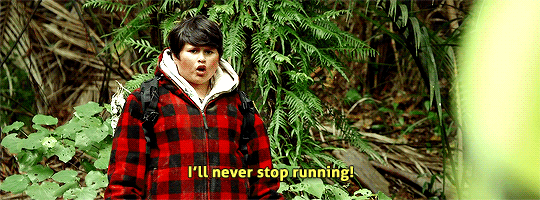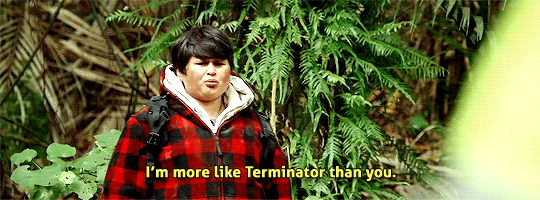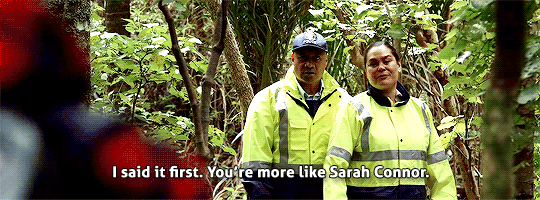Review: ‘Hunt For The Wilderpeople’ Is A Kiwi Film We Definitely Can’t Steal As Our Own
The most successful local film in NZ history has just hit Australian cinemas. It's skux.

On New Year’s Eve 2015, Canadian megastar rapper Drake posted a photo to Instagram. There’s nothing out of the ordinary about it, just him and six friends, sharply dressed. Then there was the caption: “Most Skux”. I think describing the definition of skux is a very non-skux move, so let’s just say it’s a distinctly Kiwi expression that generally means ‘good’.
The first shot we see of Hunt For The Wilderpeople’s young protagonist Ricky Baker (a starmaking turn by Julian Dennison) captures the rear of his glossy jacket reading “All Eyes On Me”. He’s a 2Pac fan, made clear by his eventual naming of a newfound canine accomplice. But the reference is one of the few non-Kiwi examples in director/writer Taika Waititi’s latest film (his last before entering the Marvel Cinematic Universe with Thor: Ragnarok).
There’s a delightful overload of local pop culture cues throughout, but they’re almost all local. Some anachronistic: an ad for a choccy bar on the telly soundtracking a young love epiphany. There’s current commentary on The Five Eyes alliance. And there are also timeless gags: the haplessness of the Auckland Warriors. It covers every level. Veteran news presenter John Campbell might not be recognised by non-Kiwi eyes, but then there’s the phonetic spelling of “stungray” on surveillance gear which is as pure and accessible a Kiwi gag can get.
This is a celebration of what New Zealand has to offer — in essence, it’s all pretty skux.
–
Taiki Waititi Says Kia Ora To The World
Hunt For The Wilderpeople has proved a resolute smash in its homeland. It took the mantle as the number one grossing New Zealand film of all time with ease. The title was previously held by Waititi’s 2010 film Boy, with the director releasing the goofball mockumentary What We Do In The Shadows in 2014. While Shadows certainly didn’t flop, it didn’t reach the heights of Boy and now Wilderpeople, despite its sharp writing and zeitgeist-baiting vampire theme.
Based on a well-loved Barry Crump novel Wild Pork and Watercres, Wilderpeople tells the story of a 13-year-old delinquent Baker as he’s placed in a new foster care home in the bush with the loving Bella (Rima Te Wiata) and stern Hec (Sam Neill). Ricky’s repeated, pseudo-feigned, attempts at escape eventually trigger a snowballing chain of misunderstandings and, eventually Hec and himself find themselves hiking through the forest. There’s no clear destination in sight for the pair, no Mordor or Mount Doom (there is however a Lord Of The Rings tip of the hat that proved too good to resist). But there is plenty of journey.
This may sound like a standard adventure narrative or buddy film, but Waititi magnificently feels out the nuances with enormous heart; even minor characters (all utilised as plot device) steal scenes while perfunctorily guiding or impeding the two travellers. Rima Te Wiata’s Bella is a larrikin matriarch. Rhys Darby makes an impression as a paranoid kook. Waititi himself revels as a priest, distracted by his own stream-of-consciousness list of confectionaries as metaphor. L&P, a rather great soft drink that sports the tagline “World famous in New Zealand”, gets a shout-out here. These caricatures make Hec’s straight-faced seriousness stand out all the more, and of course it’s him that ends up learning the life lessons.
If there’s any notion that bubbles underneath the surface through allusion, Waititi never hesitates to bring it to the fore. There’s a great sense of control throughout and, if ambiguity is present, it’s dissipated in comic fashion. If cliché threatens, it’s embraced and parlayed into something great.
Waititi does it all with a distinctive voice too, made all the more enticing by its Kiwi accent. Wilderpeople takes the charm and sensibility of Boy and garnishes it with deft slapstick and playful camera trickery.
–
After Middle Earth
It’s no secret that there’s a solid history of quality cinema across the Tasman and the Oliphaunt in the room is even addressed by Ricky near the film’s climax. More recently, the country has adapted into the era of prestige television with Jane Campion’s Top Of The Lake (with a second series due next year). Between that, an unrivalled reputation in the world of cult horror and Waititi’s continued success, it seems New Zealand cinema has come of age and is really thriving in the post-Lord Of The Rings/Hobbit era.
Ricky envisions himself before his journey as a Māori warrior fighting off British colonialists; his journey is a rationalisation of childlike, nostalgic fantasy in a world of colder modernity. All those NZ in-jokes (NZ-jokes?) are never really played for cheap laughs, instead used to paint a broader picture of place. Waititi weaves through a mix of style and substance akin to Michel Gondry at his peak, or Wes Anderson, particularly the balance of levity and realness in the swiftness of death.
Then there’s the landscape. It’s no secret that New Zealand is a great lookin’ spot of earth. But it’s presented here with typical Kiwi understatement, a sort of chur-bro nonchalance — no sweeping orchestral swells, don’t need it mate. The landscape isn’t the character here, simply a playground for the manhunt romp. The elements don’t really antagonise our heroes. That’s left to relentless child services officer Paula Hall (Rachel House). There’s comedy in her incompetence, but Paula tempers shortcomings with ridiculous ambition and sloganeering.




Right now in the US, there’s a new sensation in the NBA playoffs: Steven Adams. Not only is he smashing it on the court, the press are becoming more and more fascinated with his Kiwi demeanour. While the world might view previous Kiwi exports — Russell Crowe, Fred Hollows, Phar Lap, Wilderpeople’s Sam Neill, to name but a choice few — as essentially Australian, there’s no chance of Adams being portrayed as anything other than Kiwi. Same goes for Wilderpeople. The whole world is paying attention. Even Drake.
–
Hunt For The Wilderpeople is in cinemas now.
–
Lachlan Kanoniuk is Australian but loves it when people mistake him for Kiwi.

